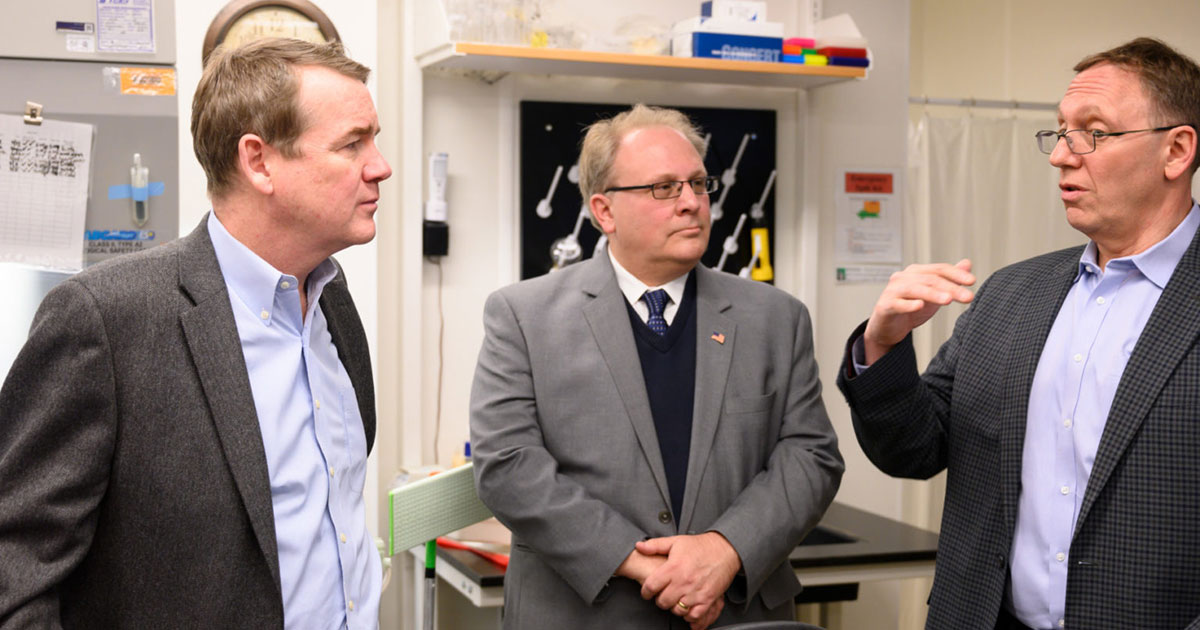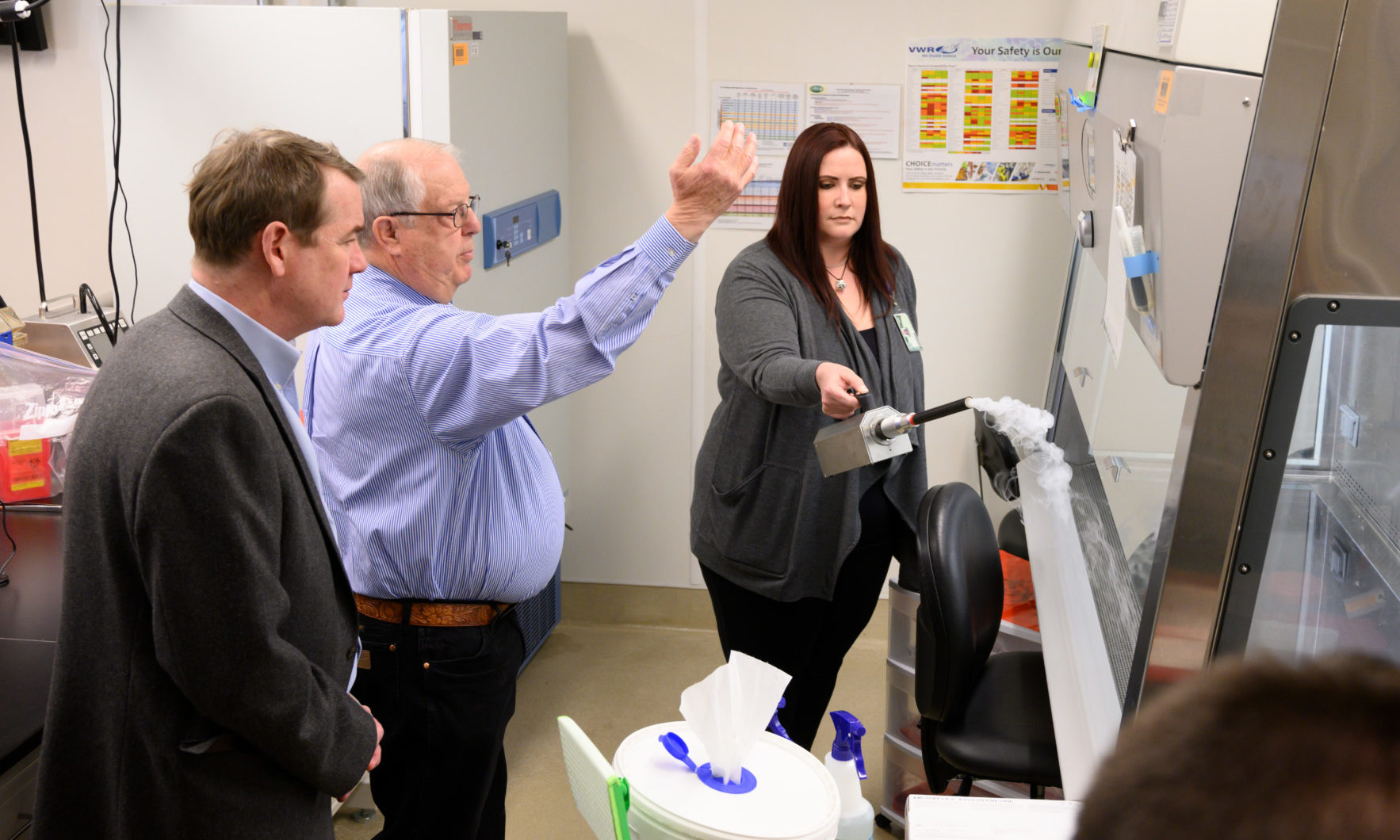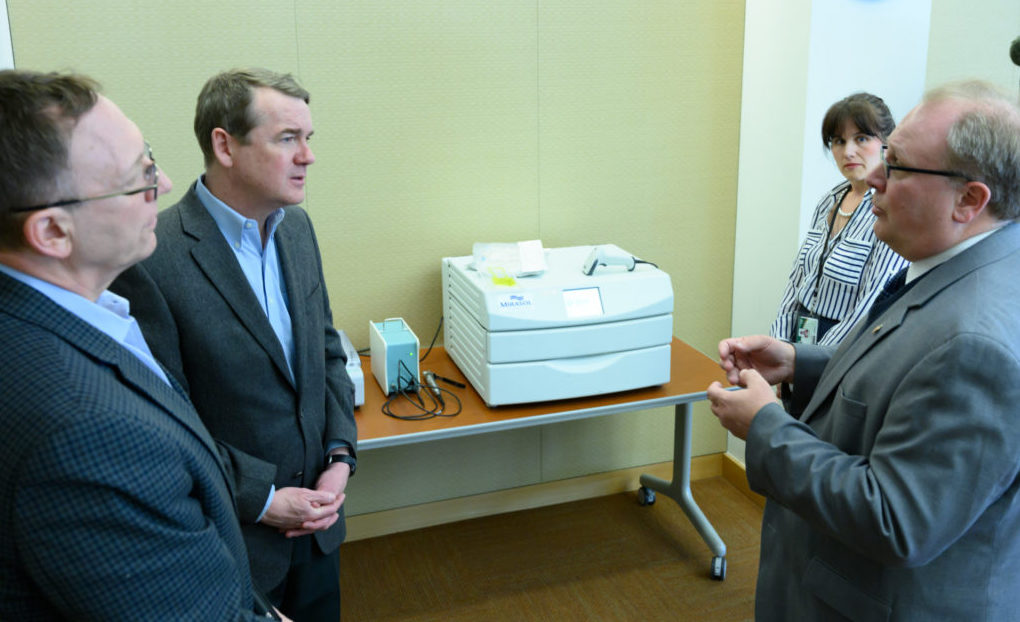
U.S. Sen. Michael Bennet; Ray Goodrich, executive director of CSU’s Infectious Disease Research Center; and Alan Rudolph, CSU vice president for research, discuss CSU’s approach to researching a vaccine for the novel coronavirus.
As the world looks for ways to stop the spread of the new coronavirus, Colorado State University has activated a unique combination of national experts, facilities, and vaccine manufacturing capability to help in the fight.
“Once again, when it comes to this kind of research, CSU is the center of the universe,” said U.S. Sen. Michael Bennet (D-Colorado), who toured CSU’s Infectious Disease Research Center on March 4. “They’ve got the people and they’ve got the facilities, and they’ve got the history with dealing with viruses like this one.”
The CSU center is one of the nation’s secure Biosafety level 3 (BSL-3) facilities, where special construction, filters and other safety equipment, along with rigorous training, allow experts to safely conduct research with microbes such as those that cause yellow fever, malaria, plague, SARS, MERS and other contagious diseases. In mid-February – as the current coronavirus outbreak was beginning to spread to countries outside China – research teams at the IDRC received live samples of the new coronavirus that causes COVID-19, and within days they were working to create an inactivated version to use as they attempt to create an effective vaccine.
“You create a virus particle that has all of the characteristics of the native virus, but it can’t replicate. It can’t cause disease. And that’s – we believe – a good candidate for a vaccine,” said Dick Bowen, professor in CSU’s Department of Biomedical Sciences and a preeminent researcher in infectious diseases. Bowen has been deeply involved in research of two other types of coronavirus that caused global outbreaks: SARS in 2003 and MERS in 2012.
Research expertise
In the SARS and MERS outbreaks, bats and camels were discovered to be key vectors in the spread of the viruses. At the time, the expertise of CSU’s Veterinary Teaching Hospital and the Veterinary Diagnostic Lab gave CSU a head start in being able to offer important research expertise on bats and camels to the urgent worldwide effort to understand and slow those outbreaks.
In the spread of the current coronavirus, bats are again a probable transmission vector, and CSU’s expertise puts this R1 public research university in a position to lead the way toward better understanding of the virus and a possible vaccine.
“We have the knowledge of how to do this and how to do it in a very effective way,” said Ray Goodrich, executive director of the IDRC and a professor in the Department of Microbiology, Immunology and Pathology at CSU. “There’s a lot that we’re building off of that gives us a leg up, and that’s the thing that you need when you’re dealing with an emerging disease. You need to get ahead of it, because (without that) you’ll quickly fall behind.”
In addition, Goodrich explained, CSU’s unique capability to create and mass-produce vaccine through BioMARC, part of the IDRC, is another reason the university is well-positioned to help lead in the fight against diseases like COVID-19. BioMARC is a nonprofit biopharmaceutical manufacturing operation that operates in compliance with Good Manufacturing Practice (GMP) requirements used by the FDA and other regulatory agencies for the production of pharmaceuticals suitable for human use.
BioMARC’s ability to scale production of vaccines, and translate basic research findings into practical and compliant manufacturing procedures, is an incredible resource in the fight against an emerging disease like COVID-19, Goodrich said.
“The beauty of the processes that we are developing in CSU labs for making a vaccine for COVID-19 is that it’s fast, it’s rapid, and we also have the capability to assess its effectiveness and safety in initial pre-clinical testing,” he added. “The fact that we can also use the facilities and skills of BioMARC personnel to scale up production of a vaccine candidate in a way that is compliant with GMP requirements is really a valuable asset to the state and the nation.”
Sharing knowledge
Several of the dozen-plus infectious disease experts who are studying the COVID-19 virus at CSU described their work and answered questions at a community Coronavirus Outbreak Forum on campus Feb. 19. A video of the forum is online here. The researchers’ overarching message was much the same as Sen. Bennet’s as he toured the CSU facility.
“We have to take it very seriously, but we shouldn’t panic,” Bennet said, standing in a mock BSL-3 lab – used for training – where CSU researchers sharpen their skills before they enter parts of the facility where work with the actual viral agents is done.
“It’s always exciting to be at CSU because, these guys are on the cutting edge of so much scientific research and it’s really exciting to know it’s right here in Colorado,” he added. “They’ve made an investment in people, they’ve made the investment in facilities, they have the ability not just to invent this but to manufacture. That didn’t come without a lot of vision and a lot of hard work and a lot of planning and I’m really excited that it’s right here in the state of Colorado.”
See news coverage of CSU’s Infectious Disease Research Center and U.S. Sen. Bennett’s visit on 9News, CBS4, Denver7, Coloradoan, and The Colorado Sun.

